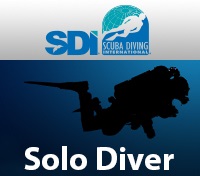Solo Diver
SDI SOLO DIVER
At one point or another, many divers have found themselves alone during a dive, whether it was intentional or not. SDI’s Solo Diving is the practice of self reliant scuba diving without a “dive buddy.”
Solo diving, once considered technical diving and discouraged by most certification agencies, is now seen by many experienced divers and some certification agencies as an acceptable practice for those divers suitably trained and experienced. Rather than relying on the traditional buddy diving safety system, solo divers should be skilled in self-sufficiency and willing to take responsibility for their own safety while diving.
Being one of SDI’s most popular courses, the Solo Diver course stresses proper dive planning, personal limitations, and accident prevention, as well as the benefits, hazards, and proper procedures for diving solo. You will also learn the additional equipment that is required for solo diving including its proper usage and assembly. This is the perfect course for underwater photography and underwater video divers as well as those diving with their children or buddies that may not very experienced in scuba diving.
Who this course is for:
The certified SDI Advanced Diver (or equivalent) who is interested in learning how to dive independent of a dive buddy, or looking to strengthen your buddy team diving skills.
Course prerequisites:
- Minimum age 21
- Certified SDI Advanced Diver or equivalent
- Provide proof of 100 logged dives
What’s in it for you?
Upon successful completion of this course, graduates may engage in solo diving activities without direct supervision of the SDI Instructor as long as the following limits are adhered to:
- The diving activities approximate those of training
- The areas of activities approximate those of training
- Environmental conditions approximate those of training
The SDI Solo Diver certification counts towards a single specialty rating to complete the SDI Master Scuba Diver Development program.
Availability: Contact us for booking information
SDI Solo Diver with Motor City Scuba Gear Requirements:
- Basic open water scuba equipment as required for SDI courses:
- 1. Mask, fins and snorkel
- 2. Buoyancy compensator device (BCD) with a low-pressure power inflator
- 3. Regulator with submersible pressure gauge (see note)
- 4. Alternate air source
- 5. Weight system
- 6. Personal dive computer (PDC)
- 7. Exposure suit adequate for the training conditions
- 8. Compressed gas cylinder
- 9. Compass
- 10. Rescue signal
- A cutting device easily accessible with either hand
- An additional Personal Dive Computer (PDC)
- Wetnotes
- An additional Independent Regulator with air souce (at least 30cuft)
- One of the following must be used to provide an additional independent regulator attached to an air source: pony cylinder, twin cylinders with isolation or H-valve.
What you can expect to learn:
The SDI Solo Diver course takes an in-depth look at all of the following and more:
- Why solo dive?
- History of buddy diving
- Pros and cons of buddy diving and solo diving
- Legal liability assumed by buddy diving
- How to use the SDI Solo Diving waiver and release
- Who must solo dive?
- The solo diving mentality
- When not to solo dive
- Equipment for solo diving
- Planning and conducting a solo dive
- Navigation
- Management of solo diving emergencies
- Review the SDI Solo Diver Liability Release and Express Assumption of Risk Agreement Form



